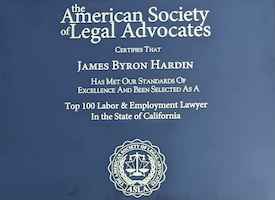The EEOC’s Guidance on the ADA and Employers’ Leave of Absence Policies
Many Orange County employers are unclear as to the type and scope of legal protections available to employees with a recognized disability. Under the Americans with Disabilities Act (“ADA”), employees are offered various types of safeguards, including the right to not be discriminated against because of his or her disability, and can seek “reasonable accommodations,” including a leave of absence, for their disabilities.
According to the ADA, employers are required, under certain circumstances, to reasonably accommodate an employee’s physical or mental impairment that limits a “major life activity” for that employee. One way in which employees have sought to be accommodated is by obtaining leaves of absence from their jobs in order to accommodate their disability. This can result in a conflict between employee and employer. Whereas an individual with a disability may feel a leave of absence is crucial to his or her health and well-being, employers often feel that extended leaves of absence are too disruptive to their business operations, and therefore not “reasonable.” Discuss your rights as an employee with an experienced ADA lawyer in Orange County.
While a leave of absence can certainly be a reasonable accommodation, the ADA does not provide specific guidance on the issue. However, the Equal Employment Opportunity Commission (abbreviated “EEOC”) has taken the position that an employer cannot terminate an employee simply because the employee is unable to return to work for a given period of time. Instead, the EEOC has stated that it views such policies (which would allow for terminating an employee for taking a leave of absence) as violations of the ADA’s requirement that each employer treat requests for reasonable accommodations on an individualized basis.
In the EEOC’s guidelines, it specifically states that an employer may not apply a “no-fault” leave policy, under which employees may be terminated after they have been on leave for a certain period of time, to employees with disabilities who require leave beyond a set period. Furthermore, in order to take such action the employer must show that (1) there is another effective accommodation that would enable the person to perform the essential functions of his/her position, or (2) granting additional leave would cause an undue hardship. Additionally, the EEOC states that an employer must hold open an employee’s job during his or her leave of absence as a reasonable accommodation. In other words, an employee with a disability is entitled to return to his or her same position upon returning from a leave of absence, unless the employer demonstrates that holding the position open would impose an undue hardship upon the employer.
As the EEOC’s guidance demonstrates, the protections available to employees covered by the ADA extends beyond the plain text of the ADA. Make sure that you are familiar with these intersections of federal law. Contact the experienced Orange County employment lawyers at Hardin & Associates to learn more.





















